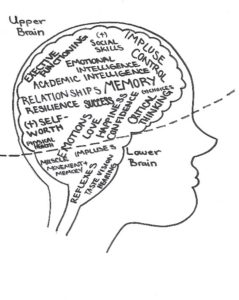
Not everyone is going to nerd out over the brain like me. I get that.
Luckily, for our parenting purposes, you only need an extremely basic understanding of the brain to reap the benefits.
Let start by breaking the brain into two insulting simple pieces (my apologies to neuroscientist everywhere), please refer to my amazing drawing of the brain below.

To begin, let’s pay our respects to the lower brain.
Function:
The lower brain is known as the “reptile” brain. In that, the lower brain is primitive and its primary purpose is to keep us alive. To do that, the lower brain is always assessing for “threats,” and is in control of the essentials (Reflexes, reactions, instincts, etc.) that keep our most basic needs met throughout life (i.e., feed, safe, etc.).
An essential distinction to remember is that the lower brain doesn’t “think,” it purely reacts.
Development:
The lower brain’s “critical window” of development is completed in-utero. Meaning the lower brain is almost fully developed at birth. This is good because this is the driving force responsible for your little wanting to eat (instinct) and knowing how to suck (reflex) straight out of the womb.
How does all this brain talk apply to parenting?
Realistic Expectation #1:
Infants’ and young children’s lower brains are much more developed than their upper brains. And when their lower brains are in charge, that means they are 100% pure impulse. 100% pure emotion. 100% pure reactivity.
From about 0-3ish months, your little’s lower brain has total control. Around four months, you’ll start to notice more and more upper brain activity; However, due to the slow maturation process of the upper, the lower brain will easily be triggered (and take control) for many years to come.
What does this mean? If it feels hard, that’s because it is hard. It doesn’t mean you are doing something wrong. And because you can’t speed up the maturation process, it’s essential that you prioritize self-care and seek support.
Realistic Expectation #2:
The lower brain does not “think,” is merely responses to “threats” (real or perceived). Because our littles don’t have a developed upper brain to help them sort out and manage their responses, their lower brain is easily and often triggered. As a result, infants (especially newborns) cry a lot.
What does this mean? Infants are not trying to manipulate or torture you, even though it feels that way at times. When babies cry they are expressing a need that, to them, feels very intense and urgent. For this reason, it is important to know that you can not spoil a baby by responding to their cries. AND that expectation #1 is very important, in that this is hard and you need to take care of yourself in order to continuously meet the needs of your little.
Please know, if you ever feel overwhelmed in responding to your little’s cries, it’s ok to place them somewhere safe and walk to self-soothe for a couple minutes. This will not damage them. Additionally, around 3-5 months you’ll start to notice a difference in your littles “want whines” versus their “need cries.” This will provide you with much more wiggle room when it comes to responding.
For additional helpful tools and tips for parenting the lower brain click HERE.
Ok, let’s now have a conversation about the upper brain.

